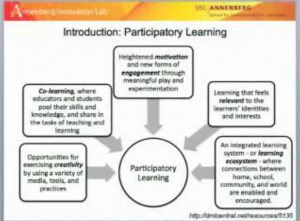 Yesterday I had the opportunity to re-join my brilliant colleagues Erin Reilly, Ioana Literat, Sarah Kirn, and Sarah Morrisseau for a chat about our recent media-rich publication, Designing with Teachers: Participatory Approaches to Professional Development in Education. Our talk was moderated by the accomplished S. Craig Watkins and took place via LiveStream ConnectedLearning.tv webinar. To my delight, this technology again allowed me to show up, in real time, on the computer screen of an international friend. Whereas my first brush with webinar-ing motivated my colleague Cathy Tran to proclaim on FB from Norway, “I see you on “TV”!!! :)”, this time my colleague Tidiane Thang posted on FB from Senegal, “Don’t worry be happy, you started a great presentation.”
Yesterday I had the opportunity to re-join my brilliant colleagues Erin Reilly, Ioana Literat, Sarah Kirn, and Sarah Morrisseau for a chat about our recent media-rich publication, Designing with Teachers: Participatory Approaches to Professional Development in Education. Our talk was moderated by the accomplished S. Craig Watkins and took place via LiveStream ConnectedLearning.tv webinar. To my delight, this technology again allowed me to show up, in real time, on the computer screen of an international friend. Whereas my first brush with webinar-ing motivated my colleague Cathy Tran to proclaim on FB from Norway, “I see you on “TV”!!! :)”, this time my colleague Tidiane Thang posted on FB from Senegal, “Don’t worry be happy, you started a great presentation.”
Tidiane was comforting me because my computer connection went awry — I might have had too many windows open (I was trying to backchannel with listeners via LiveStream chat as well as answer a few emails and skim the PDF, then toggle back to the webinar screen and see if I’d missed anything in our internal chat). I spoke around minute 33, then got kicked off at 34:24 in a very tragic, abrupt fashion. The “hilarious” part is that I continued speaking for at least two more minutes after that! :) Oy. I spoke up again around 40:30, got all touchy-feely around 47:30 by throwing down the term “self-actualization,” then revealed my obsession with food by likening technology to dessert around 49:50.
Beyond navel-gazing, though, I appreciated the opportunity to acknowledge the complexities and constraints that teachers negotiate. I’m disappointed by the reductive rhetoric that is usually invoked vis-a-vis school reform and American achievement. Rather than respect teachers as professionals, stakeholders, and heroes, we villainize teachers as lazy, underperforming, or even lascivious. How many more stories about teacher-on-student abuse have we heard than stories about teacher-for/with-student uplift? If the teacher isn’t female, white, and cute, and if her students aren’t black, brown, and poor, then the extraordinary teacher story isn’t deliberately buried — it’s never pursued or located in the first place.
I admire teachers’ work. I value researchers’ knowledge. If we could bring together these two products and their respective producers by translating and collaborating, as well as welcome more constituents including administrators, students, parents, and community members, then what a dynamo we would have. Then just try to stop us! Who could stop us? Everyone would be on board, helping to push us along!
I’m a lucky human being (as I own at 55:42!) and a motivated partner. Let’s make some magic, mes amis.

